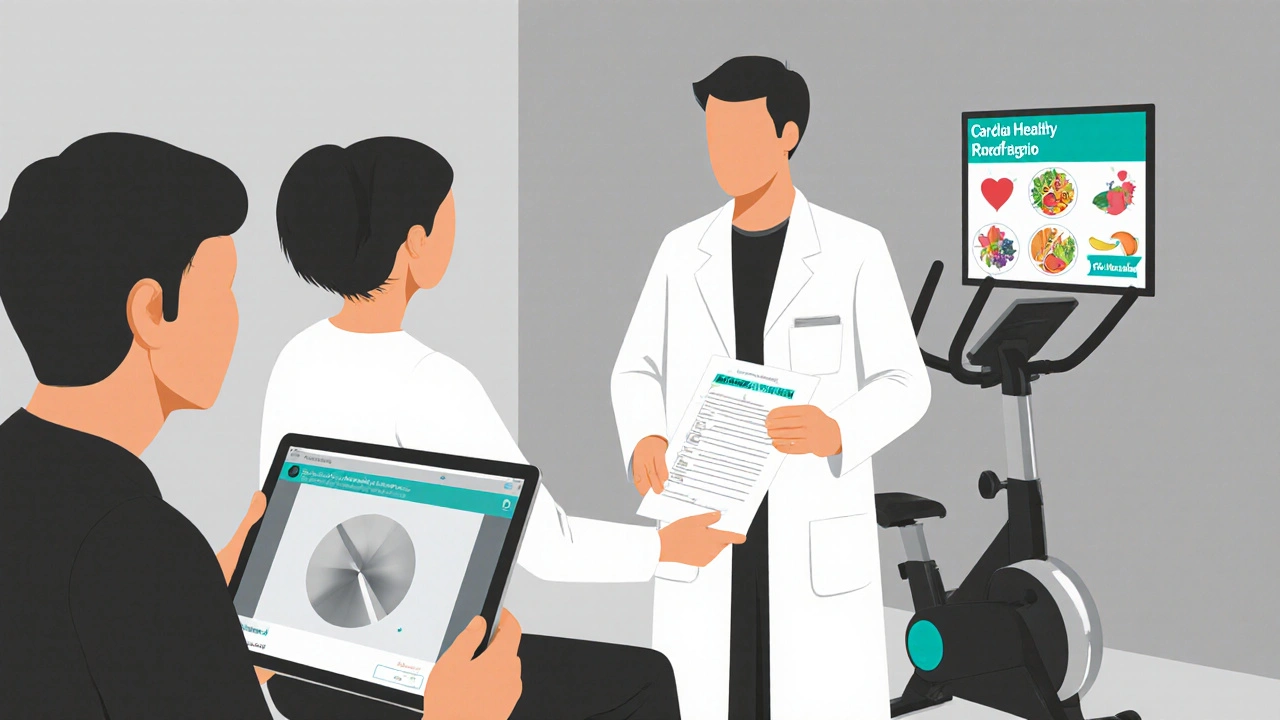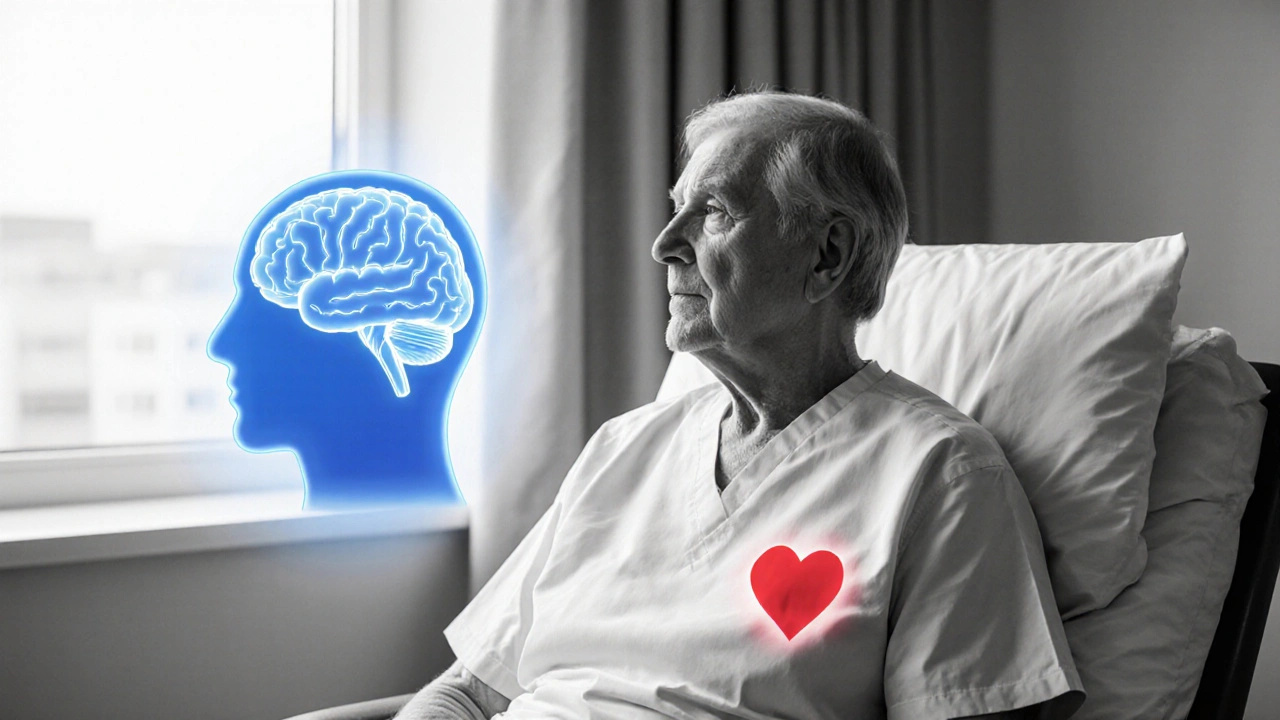Key Takeaways
- Depression is common in people with heart failure and worsens outcomes.
- Regular screening with simple tools like the PHQ‑9 can catch it early.
- Combining medication, psychotherapy, and cardiac rehab offers the best chance for improvement.
- Everyday habits-exercise, sleep, nutrition, and stress management-play a huge role.
- Never wait for a crisis; reach out to a doctor or support group at the first sign.
Living with heart failure can feel like a constant battle, and it’s easy to let the emotional side slide. The truth is, the heart and the mind are tightly linked; when one struggles, the other often follows. Below you’ll find a clear roadmap for spotting depression, treating it safely, and building day‑to‑day habits that lift your mood without hurting your heart.
Understanding the Link Between Heart Failure and Depression
Heart failure is a chronic condition where the heart cannot pump enough blood to meet the body’s needs. This chronic stress triggers hormonal changes, reduces activity levels, and often leads to feelings of hopelessness. Across studies, about one in three heart‑failure patients also meet criteria for depression, a mood disorder marked by persistent sadness, loss of interest, and low energy.
Why does this happen? The heart’s reduced output can cause fatigue and shortness of breath, limiting social life and hobbies. At the same time, the body releases stress hormones like cortisol, which affect brain chemistry. The cycle-physical limitation fuels low mood, low mood reduces motivation for self‑care, and the health of the heart worsens-can become hard to break without an intentional plan.
Spotting Depression Early: Simple Screening Tools
Doctors often use the PHQ‑9 questionnaire-a nine‑question survey you can fill out in the clinic or at home. A score of 10 or higher usually signals moderate depression and warrants further evaluation.
Key signs to watch for include:
- Persistent low mood lasting more than two weeks.
- Loss of interest in activities you once enjoyed.
- Changes in appetite or weight.
- Sleep disturbances-insomnia or oversleeping.
- Feeling worthless or excessive guilt.
- Thoughts of self‑harm or hopelessness.
If you notice several of these symptoms, schedule a check‑in with your cardiology team. Early detection is the first step toward better outcomes.
Why Treating Depression Matters for Heart Health
Untreated depression isn’t just an emotional burden; it directly harms the heart. Studies show that depressed heart‑failure patients have a 30‑40% higher risk of hospitalization and a 20% increase in mortality. Depression can lead to poorer medication adherence, lower participation in cardiac rehab, and unhealthy coping habits like smoking or overeating.
Conversely, effective treatment improves quality of life, boosts exercise tolerance, and may even prolong survival. That’s why most heart‑failure guidelines now recommend routine mental‑health screening and integrated care.

Integrated Care Strategies: Medications, Therapy, and Rehab
When heart failure and depression coexist, a combined approach works best.
Medication Choices Safe for the Heart
Selective serotonin reuptake inhibitors (SSRIs) such as sertraline and escitalopram are generally safe for heart‑failure patients. They have minimal impact on blood pressure and heart rhythm. Tricyclic antidepressants, however, can affect cardiac conduction and are usually avoided.
| Medication | Class | Typical Dose | Heart‑Failure Safety Note | Common Side Effects |
|---|---|---|---|---|
| Sertraline | SSRI | 50‑200mg daily | Low cardiac risk; no QT prolongation | Nausea, insomnia |
| Escitalopram | SSRI | 10‑20mg daily | Well‑tolerated in HF; monitor electrolytes | Headache, dry mouth |
| Bupropion | Atypical | 150‑300mg daily | Generally safe; watch for hypertension | Agitation, tremor |
| Amitriptyline | Tricyclic | 25‑100mg nightly | Can cause arrhythmias; avoid in severe HF | Constipation, dry mouth |
Psychotherapy That Fits a Busy Life
Psychotherapy, especially cognitive‑behavioral therapy (CBT), helps reframe negative thoughts and develop coping skills. Recent trials show CBT can lower PHQ‑9 scores by 5‑7 points in heart‑failure patients, and the benefits persist for at least six months.
For many, tele‑health CBT sessions work well-they’re short, flexible, and don’t require travel, which can be a big barrier when you’re short of breath.
Cardiac Rehabilitation: A Double‑Benefit Program
Cardiac rehabilitation (CR) combines supervised exercise, education, and counseling. Participants typically see a 20‑30% reduction in depressive symptoms, alongside improved heart‑failure metrics like ejection fraction.
If your clinic offers a CR program, ask about the mental‑health component. Many programs now include a psychologist or social worker to address mood alongside physical training.
Everyday Self‑Care Tips to Boost Mood and Heart Health
Small habits add up. Here are six evidence‑based actions you can start today.
- Move a Little Every Day-Even a 10‑minute walk around the garden raises endorphins and improves circulation. Aim for a total of 30 minutes of moderate activity weekly, gradually increasing as tolerated.
- Eat a Heart‑Friendly, Mood‑Supporting Diet-Focus on omega‑3‑rich fish, leafy greens, berries, and whole grains. These foods provide nutrients like folate and magnesium that help stabilize mood.
- Prioritize Sleep-Aim for 7‑8 hours of restful sleep. Use a bedtime routine, keep the bedroom cool, and limit caffeine after noon.
- Practice Stress‑Reduction Techniques-Simple breathing exercises, guided meditation, or progressive muscle relaxation can lower cortisol and improve heart‑rate variability.
- Stay Connected-Regular phone calls or video chats with friends and family lower feelings of isolation. If you’re comfortable, share your health journey; openness often reduces stigma.
- Limit Alcohol and Quit Smoking-Both substances worsen heart failure and increase depression risk. Seek support programs if you need help cutting back.
Building a Support Network
A support group gives you a safe space to share fears, learn coping tricks, and hear success stories. Many hospitals in the UK run weekly in‑person sessions; many charities also host online forums.
Don’t underestimate the power of a caregiver or family member who knows the warning signs. A simple checklist you can hand to them-like noting mood changes or missed medications-helps catch problems early.

When to Seek Professional Help Immediately
If you experience any of the following, call your GP, cardiologist, or emergency services right away:
- Thoughts of self‑harm or a plan to act on them.
- Sudden worsening of shortness of breath or chest pain.
- Severe confusion, disorientation, or inability to perform daily tasks.
- Rapid weight gain (more than 2‑3kg in a few days) indicating fluid overload.
Early medical intervention can prevent a crisis and set you back on a path to recovery.
Quick Reference Checklist
- Ask your doctor for a PHQ‑9 screening at each HF visit.
- Consider an SSRI if medication is needed; avoid tricyclics.
- Enroll in a cardiac rehab program that includes mental‑health counseling.
- Schedule weekly or biweekly CBT (in‑person or tele‑health).
- Do 10‑minute walks most days; increase gradually.
- Eat fish, nuts, fruits, and vegetables; limit processed foods.
- Maintain a regular sleep schedule; wind down 30min before bed.
- Join a local or online support group; share experiences.
- Reach out to your care team if mood worsens or you have safety concerns.
Frequently Asked Questions
Can depression cause heart failure?
Depression itself doesn’t directly damage the heart, but it can lead to behaviors-like inactivity, poor diet, and smoking-that increase the risk of developing heart failure over time.
Are antidepressants safe for someone with a pacemaker?
Most SSRIs are safe with pacemakers. However, it’s essential to discuss any new medication with your cardiologist, as some drugs can affect electrolyte balance, which influences device function.
How often should I be screened for depression?
Guidelines recommend screening at every major heart‑failure visit-typically every 3‑6 months-or sooner if you notice mood changes.
Can exercise worsen my heart failure?
When done under medical guidance, exercise is protective. Over‑exertion can trigger symptoms, so start slowly and let your cardiac rehab team set safe intensity levels.
Is tele‑health CBT as effective as in‑person therapy?
Recent research shows comparable reductions in depressive scores for tele‑health CBT, especially when patients have reliable internet and a quiet space.

9 Responses
Hey folks, thanks for diving into this super important topic!
Managing depression while battling heart failure can feel like juggling flaming torches, but you’ve got this.
First up, remember that screening is a game‑changer – grab a PHQ‑9 next time you’re at the clinic.
If the score nudges above ten, don’t wait, bring it up with your doctor right away.
A simple medication like sertraline often does the trick without messing with your heart rhythm.
Pair that with a few minutes of CBT each week and you’ll start noticing a lift in mood.
And hey, daily movement – even a 10‑minute stroll around the block – releases endorphins that love your heart.
Nutrition matters too; think salmon, leafy greens, and berries to feed both brain and ticker.
Prioritizing sleep isn’t a luxury, it’s a prescription – aim for 7‑8 solid hours.
Stress‑reduction tricks like box breathing or a quick meditation can drop cortisol and calm the chest.
Stay connected: a quick video call with a friend can cut feelings of isolation in half.
If you ever feel a dark thought creeping in, reach out immediately – crisis lines exist for a reason.
Cardiac rehab isn’t just about treadmills; many programs now embed mental‑health coaches.
Build a checklist for your caregiver so they spot mood shifts before they snowball.
Keep tracking your progress, celebrate tiny wins, and remember you’re not alone on this journey! 😊
Listen up, the pharma giants love to sweep depression under the rug when you have a busted heart.
They push pills that sound sweet but hide side‑effects like silent arrhythmias.
The real power move is self‑monitoring and demanding a second opinion before any new tablet lands on your shelf.
Trust your gut, demand transparent data, and never let a shiny prescription replace solid lifestyle changes.
The drama of a ‘quick fix’ is just a circus, not a cure.
From a clinical perspective, the integration of psychological assessment into routine cardiology visits is essential.
Evidence indicates that routine PHQ‑9 administration can identify depressive symptoms with a sensitivity exceeding 80 %.
Subsequent initiation of selective serotonin reuptake inhibitors has been demonstrated to possess a favorable cardiac safety profile.
Moreover, cognitive‑behavioral therapy, particularly when delivered via telehealth platforms, yields statistically significant reductions in PHQ‑9 scores.
Cardiac rehabilitation programs that incorporate psychosocial modules further augment functional capacity and quality of life.
It is advisable for practitioners to adopt a multidisciplinary approach, thereby aligning pharmacologic and non‑pharmacologic interventions.
Look, the numbers don’t lie – depression spikes readmission rates by almost a third.
Yet the system treats the mind like an afterthought, slapping a generic SSRI on the chart without monitoring electrolytes.
Patients get tossed into rehab programs that focus on treadmill time while ignoring the silent scream of hopelessness.
This oversight fuels a vicious cycle: low mood → missed meds → worsening heart function.
The data is clear, and the failure to act is a betrayal of basic care standards.
Wake up, health providers, and give mental health the priority it deserves.
Imagine the heart as a drumbeat of existence, each pulse echoing the rhythm of our inner narrative.
When depression settles in, it is as if a storm clouds the drum, muffling its resonance.
Yet within that darkness lies a paradox: the very struggle can ignite a deeper awareness of our fragility and resilience.
By confronting the shadows, we unearth a reservoir of courage that the body can translate into regenerative force.
The act of walking, however brief, becomes a pilgrimage toward reclaiming harmony.
Nutrition, sleep, breath – they are the alchemical elements that transmute despair into vitality.
In this sacred dance, the therapist is a guide, the medication a subtle catalyst, and the patient the alchemist of self.
Let us therefore honor each step, each breath, as a testament to the indomitable spirit that refuses to be silenced. 🌟
Depression and heart failure together are a toxic combo nobody wants.
Your checklist idea for caregivers is brilliant; it creates a tangible safety net and empowers families to act early.
Incorporating simple mood‑tracking charts alongside weight logs could catch subtle shifts before they become crises.
Also, reminding patients to schedule PHQ‑9 screenings every three months ensures consistent monitoring without feeling invasive.
Great work on blending clinical guidance with everyday practicality.
Absolutely agree, Vanessa. The system must treat mental health as a core pillar, not an afterthought, and a coordinated approach can turn those statistics around.
This so‑called ‘holistic’ plan is a joke; you keep hiding the real problem behind buzzwords while patients suffer.
Stop sugar‑coating the failures and demand real accountability now.